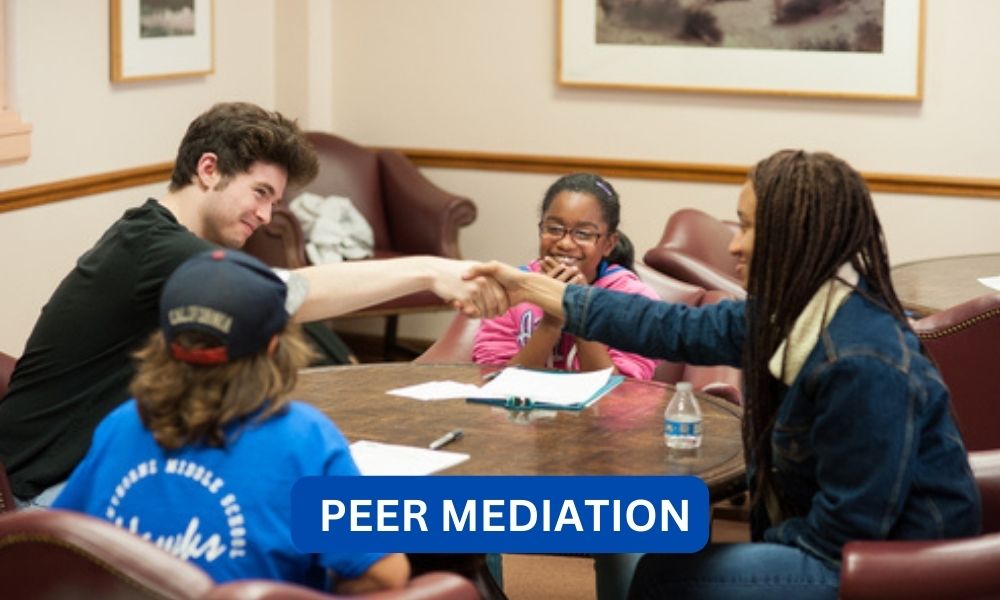Conflict is a natural part of human interaction, and it can arise in any setting, whether it be at school, work, or within personal relationships. When conflicts arise, it is important to have effective methods of resolving them in a peaceful and productive manner. One such method is peer mediation, which involves trained students helping their peers resolve conflicts through open communication and problem-solving techniques. In this article, we will explore the benefits of peer mediation and discuss which situations would most likely benefit from this approach.
Contents
What is Peer Mediation?
Peer mediation is a form of conflict resolution that involves trained students acting as mediators to help their peers resolve conflicts. The mediators are neutral and do not take sides, but rather facilitate a conversation between the conflicting parties to help them find a mutually agreeable solution. This approach is based on the belief that peers are more likely to listen to and understand each other, leading to a more effective resolution of the conflict.
Peer mediation is typically used in schools, but it can also be applied in other settings such as workplaces and community organizations. The process involves a series of steps, including setting ground rules, allowing each party to share their perspective, identifying the underlying issues, and working together to find a solution that satisfies both parties.
Read:Do athletic scholarships cover everything?The Benefits of Peer Mediation
Peer mediation has numerous benefits for both the individuals involved in the conflict and the larger community. Let’s take a closer look at some of these benefits:
- Empowers Students: Peer mediation empowers students by giving them the skills and tools to resolve conflicts on their own. It teaches them how to communicate effectively, listen actively, and work together to find a solution. This not only helps them in the present conflict but also equips them with valuable skills for future conflicts.
- Promotes Positive Relationships: By involving peers in the conflict resolution process, peer mediation promotes positive relationships between students. It encourages empathy, understanding, and respect for each other’s perspectives, leading to a more harmonious school environment.
- Reduces Bullying and Violence: Conflict is often a precursor to bullying and violence. By addressing conflicts early on through peer mediation, it can prevent these negative behaviors from escalating. Studies have shown that schools that implement peer mediation programs have lower rates of bullying and violence.
- Improves Academic Performance: When students are involved in conflicts, it can affect their academic performance. By resolving conflicts through peer mediation, students can focus on their studies and perform better in school.
- Cost-Effective: Peer mediation is a cost-effective approach to conflict resolution. It does not require hiring outside professionals, and the training for peer mediators is relatively inexpensive. This makes it a viable option for schools and organizations with limited resources.
Which Situations Would Most Likely Benefit from Peer Mediation?
While peer mediation can be used in a variety of situations, there are certain scenarios where it is particularly effective. Let’s take a look at some of these situations:
Read:Does mit have scholarships?- Peer Conflicts: As the name suggests, peer mediation is most effective in conflicts between peers. This could include conflicts between students in the same grade, class, or social group. Peer mediators are better able to understand the dynamics of these relationships and can help the conflicting parties find a resolution that works for both of them.
- Minor Conflicts: Peer mediation is best suited for minor conflicts that do not involve serious issues such as violence or bullying. These could include disagreements over a game, a misunderstanding, or a small argument. By addressing these conflicts early on, peer mediation can prevent them from escalating into more serious issues.
- Ongoing Conflicts: Some conflicts may persist over time, and traditional methods of conflict resolution may not have been successful. In such cases, peer mediation can be a useful approach as it involves peers who may have a better understanding of the underlying issues and can help the conflicting parties find a long-term solution.
- Cultural or Racial Conflicts: In diverse communities, conflicts may arise due to cultural or racial differences. Peer mediation can be an effective way to address these conflicts as it involves peers who may have a better understanding of each other’s backgrounds and can facilitate a conversation that promotes understanding and respect.
Real-Life Examples of Peer Mediation
Peer mediation has been successfully implemented in schools and organizations around the world. Let’s take a look at some real-life examples of how peer mediation has helped resolve conflicts:
Read:Can colleges pull athletic scholarships?- Peer Mediation in a Middle School: In a middle school in California, peer mediation was used to resolve conflicts between students. The program was so successful that it reduced the number of suspensions and expulsions by 50%. It also helped improve the school’s overall climate, with students reporting feeling safer and more connected to their peers.
- Peer Mediation in a Workplace: A company in New York implemented a peer mediation program to address conflicts between employees. The program not only helped resolve conflicts but also improved communication and teamwork among employees. As a result, the company saw an increase in productivity and a decrease in turnover rates.
- Peer Mediation in a Community Organization: A community organization in South Africa used peer mediation to address conflicts between members of different ethnic groups. The program helped promote understanding and respect between the groups, leading to a decrease in violence and an increase in cooperation.
The Role of Adults in Peer Mediation
While peer mediation is primarily led by students, adults play an important role in supporting and facilitating the program. Adults can provide training and guidance to peer mediators, help establish ground rules, and ensure that the process is fair and respectful. They can also provide resources and support for ongoing conflicts that may require additional intervention.
It is important for adults to recognize the value of peer mediation and support its implementation in schools and organizations. By doing so, they can help create a more peaceful and positive environment for students and promote the development of important conflict resolution skills.
Conclusion:
Peer mediation is a valuable tool for resolving conflicts in a peaceful and productive manner. It empowers students, promotes positive relationships, and reduces bullying and violence. While it can be used in a variety of situations, it is most effective in conflicts between peers, minor conflicts, ongoing conflicts, and cultural or racial conflicts. By supporting and implementing peer mediation programs, we can create a more harmonious and inclusive society where conflicts are resolved through open communication and understanding.
Remember, conflict is inevitable, but how we choose to resolve it can make all the difference. Peer mediation provides a powerful and effective approach to conflict resolution, and it is up to us to embrace it and create a more peaceful world.









